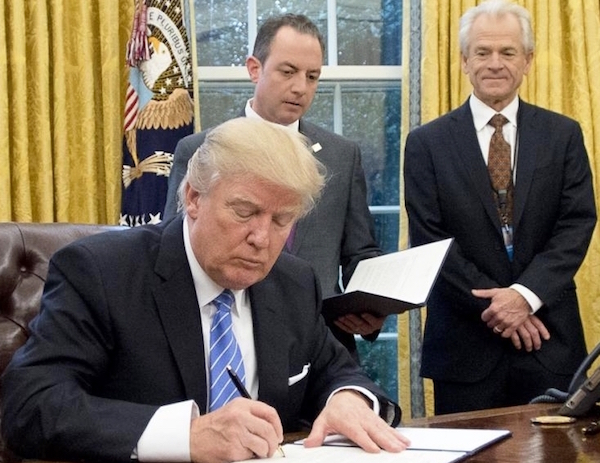Economist Peter Navarro promises Trump he will eliminate bad news and unpleasant facts

After Gary Cohn’s departure as Donald Trump’s chief economic advisor, UC Irvine economist Peter Navarro, who has declared Donald Trump’s intuition infallible, is a leading candidate to replace him.
There is a challenge for analysts and managers in every organization. On the one hand, they should be dedicated to hard evidence and truth, so that their leaders can make good decisions. On the other hand, they should be loyal.
This is what ended the tenure of Secretary of State Rex Tillerson. After UK Prime Minister Theresa May said it was “highly likely” that Russians used an exotic poison to kill a former Russian spy in England, presumably on very solid evidence, Tillerson agreed that the poison clearly came from Russia and was used with the Russians’ knowledge. Then Trump fired Tillerson and said “As soon as we get the facts straight, if we agree with them, we will condemn Russia or whoever it may be.”
“If we agree with them”?
Facts are facts. There are no alternative facts. You get to challenge the truth of facts, but if they are actually facts, you don’t get to agree or disagree with them. As John Adams said:
Facts are stubborn things; and whatever may be our wishes, our inclinations, or the dictates of our passions, they cannot alter the state of facts and evidence
This is as true now as it was in 1770 when Adams said it.
What it means to be an honest economist
For an economist, facts are problematic. Economists measure things like trade deficits and unemployment, but those measurements have flaws and uncertainty. Economists predict the future state of the economy and the effect of economic policy on it, an uncertain proposition to be sure. There are liberal economists who believe in one set of policies and conservative economists who believe in another. But all of these economists, if they are honest, use the analytical tools they have to measure what is actually happening and the likely impact of future decisions.
Here’s what Peter Navarro told Bloomberg on March 7, speaking about Trump’s decision to impose tariffs on imported steel and aluminum:
This is the president’s vision. My function, really, as an economist is to try to provide the underlying analytics that confirm his intuition. And his intuition is always right in these matters.
Any true analyst — economists included — has a duty to determine the truth as they see it. It is not the function of an economic adviser to confirm the intuition of a person who is not trained in economics. And no one is always right. In fact, I’d say the function of an economic advisor working with a president who operates solely on his own intuition, and one that is constructing his own version of reality every day, is to challenge that intuition, not to confirm it.
When everyone around you agrees with you, you are an idiot
It’s clear from what happened with Tillerson that any sort of disagreement with this president, public or private, will get you fired. The result will be a president surrounded with people who cannot challenge him.
Regardless of how smart you are, this is a bad situation to be in. If America were a company, I’d sell the stock and call for the CEO’s ouster.
Failing that, I look forward to a diverse set of honest economists to challenge every economic decision this president makes. Please bring facts and clear-eyed analysis. We need them now more than ever.
“My function, really, as an economist is to try to provide the underlying analytics that confirm his intuition. And his intuition is always right in these matters.”
In a word, no. First, who is always right? Second, in an era of Big Data, it’s not hard to find “facts” and stories that corroborate any opinions and visions no matter how absurd. True economists and analysts aim to find deeper meaning, not simply engage in confirmation bias.
This administration is a sham. I’d short the stock right with you Josh.
Navarro’s statement, when I first read it, struck me as the exact opposite of science — where you gather facts and then develop (or modify) a theory to fit. Bad science equals bad policy, every time.